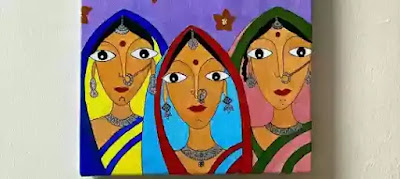Also Read
The other two female characters namely, Janamma and Gangu play a limited role in the novel. Both of them are friends and neighbours of Savitri, but are inimical to each other. Once they happen to meet each other at Savitri's house by chance. Each becomes tense and neither of the two wants to leave first lest the other should take it that she is afraid of her. Savitri feels embarrassed in the presence of the two as she is not able to know how to deal with them at the same time without annoying either. To give an impression of equality, she does not sit with either of the two and keeps on standing equi-distant from both. This presents a humorous spectacle.
Both of these two women differ in terms of their personality, ambitions and thinking. Janamma is rotund, middle-aged lady whose husband is an advocate. She is not much educated. She nurtures no ambition. She is self complacent. She represents the classical Indian mediaeval view of wifely function and duty towards one's husband when she advises Savitri, sulking in the dark room, not to disobey or argue with her husband in any situation. A wife should think that whatever her husband does is right. She says, "What he does is right. It is a wife's duty to feel so."
Gangu is of different sort. She is educated and fair-looking. She is relatively younger and has an ambition of making a career in life. She aspires to join the film line although she does not have the proper voice for it. She wants to represent Malgudi as a delegate to the Women's Conference. She participates in social activities. She has free movements during these activities. Her husband is a teacher who always-likes to help her and encourages her in these activities. Janamma feels low of her because of her open free movements. Despite her independent movements, she is not immoral. She is loyal to her husband. She is a well-wisher of Savitri. That is why she tells her about the suspicious ways of her husband i.e. Ramani whom she happens to see at the theatre in the company of a woman at night. She advises her to take care of him and to control him. She disapproves of Ramani's extra-marital movements.
Gangu and Shanta Bai share the common ambition of careerism in life. Each tries to carve out an entity in her own way. But both differ in the means they adopt for the achievement of their objective. Shanta Bai throws away every norm and moral principle in the pursuit of her career. She breaks with all social restrictions of a wife's or of a daughter's status. She entangles her boss, who is a married man and a father of three children, into her seductive snares with the selfish motive of securing his unduly lenient attitude towards her job requirements like giving a business of ten thousand rupees in the first two months and enhancement in salary. Ends and not the means are important to her. Gangu, despite her free movements, does not drift into immoral ways. She pulls on well with her husband and succeeds in enlisting his sympathy for her cause. Thus, she is more socially acceptable and desirable than Shanta Bai. She combines in her the traits of a new emerging woman in India with due regard for traditional social institution like marriage. Both can go hand in hand as exemplified in her character.
